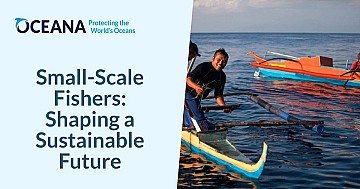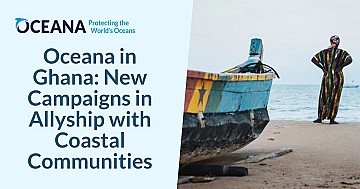Oceana reflects on 10 years of protecting coasts, reforming fisheries laws, and forging partnerships in Brazil and the Philippines
Ask Oceana’s leaders in Brazil and the Philippines how they keep winning victories for the oceans, and some patterns start to emerge.
“One of the things that Oceana has done really well in the Philippines is build a trusting relationship with small-scale fishers and show them that there is hope,” says Gloria (“Golly”) Estenzo Ramos, Oceana’s Vice President in the Philippines.
“We strengthened our engagement with artisanal fishers, whose voices had not previously been heard in Brazil,” says Dr. Ademilson Zamboni, Oceana’s Vice President in Brazil.
Understanding the importance of these partnerships — and the value of abundant oceans — helps explain why Oceana expanded to Brazil and the Philippines in 2014. Ranking 12th in the world for wild fish catch, the Philippines is home to over 100 million people who rely on marine fisheries for their food or income.
On the opposite side of the world, Brazil ranks 30th in wild fish catch and is home to 771,000 small-scale fishers, representing 71% of workers in the nation’s fishing industry.
According to Oceana CEO James Simon, ocean conservation in these two countries has an outsized impact — not just for marine life, but for the people who live and work there.
“Oceana established campaign teams in Brazil and the Philippines because we saw an opportunity to rebuild fisheries for the millions of people who rely on them for their livelihoods and — in many cases — their nutritional needs,” says Simon.
“Over the last 10 years, Oceana has fought alongside artisanal fishers in Brazil and the Philippines for policies that prioritize science-based fisheries management, tackle illegal and destructive fishing, and reduce plastic pollution in our oceans. The difference these campaigns have made for their oceans is like night and day.”
A light in the darkness
When Oceana came to Brazil a decade ago, the state of its fisheries was bleak. A lack of catch limits meant that it was always open season on fish, and many species were already showing the effects of overfishing.
“There was no data, no monitoring, no active fisheries councils, and no management plans for critical species,” says Martin Dias, Oceana’s Science Director in Brazil. “We landed here in complete darkness.”
To make a case for science-based fisheries management, Oceana campaigners knew they would have to prove its value. In 2018, the team worked with government officials to introduce a catch limit for an important fishery called tainha (mullet), then publicized its catch data in an online logbook. Two years later, the Brazilian government used Oceana’s model as the basis for its own system, making national catch data available online for the first time.
More victories followed, including catch limits for red and green lobster, which are particularly important to artisanal fishers. Oceana and its allies also restored Fisheries Management Councils that had been previously eliminated, and successfully advocated for Brazil’s industrial fishing vessel data to be made publicly available on the Global Fishing Watch map, helping to track and take down illegal fishing.
Despite greater transparency in Brazil, data is still lacking. Biological information is only known for 52% of the country’s fish stocks, according to Oceana’s 2023 Fisheries Audit, an annual report that offers the most comprehensive evaluation of fisheries management in Brazil. Of the fisheries that have enough data available, 66% are overfished.
“We have played a major role in the fisheries agenda, but unfortunately, the situation is still dire,” Zamboni says. “Brazil does not have a robust fisheries policy, and the institutions are very fragile.”
This is partly due to high turnover as administrations change, disrupting any progress made by fisheries agencies. To address this issue, Oceana is campaigning to reform Brazil’s Fisheries Law in hopes of creating a framework that isn’t subject to the revolving door of politics.
Those reforms are currently being considered in Congress, and Dias is confident they will be successful. Oceana has already spent 800 hours hashing out the details with artisanal and commercial fishers, scientists, and other nonprofits. Following a workshop supported by Oceana, fisherwomen and shellfish gatherers helped draft a letter to policymakers that advocated for language in the Fisheries Law that recognizes the identity and rights of women working in Brazil’s fishing industry.
“This is a huge achievement to me: getting small-scale fishers and the largest industries at the same table to agree on how a new Fisheries Law should be,” Dias says. “Oceana played a key role in putting everyone together to achieve the same outcome, which is reforming the law and trying to find common goals.”
‘A long fight’
Echoing Oceana’s experience in Brazil, fisheries management in the Philippines had plenty of room for improvement in 2014. That year, the European Union warned that it would ban fish imports from the Philippines if the country didn’t address its illegal fishing problem.
Soon after, Oceana leveraged this opportunity to support an updated Fisheries Code as well as the rules and regulations that govern its implementation. The amended law and regulations cracked down on illegal, unreported, and unregulated (IUU) fishing, but progress has not always been linear in a country where IUU fishing accounts for up to 40% of the fish caught.
One of Oceana’s earliest victories in the Philippines made it mandatory for all commercial fishing vessels entering the country’s largest marine protected area in the Tañon Strait — a place home to a wide array of corals, whales, and dolphins — to be tracked. In 2016, Oceana championed the installation of public tracking devices on all commercial fishing vessels, now with a compliance rate of 90%.
Ramos says this action helps to detect and deter IUU fishing throughout the country, particularly in municipal waters that extend 15 kilometers (just over 9 miles) from shore.
“Overfishing and illegal fishing remain the biggest challenges in the Philippines, particularly in municipal waters that are reserved for artisanal fishers,” Ramos says. “It’s been a long fight, but we’ve managed to block every attempt to allow commercial fishing in these waters.”
Oceana has also made significant strides on the fisheries front, successfully advocating for the creation of 12 Fisheries Management Areas (FMAs) that ushered in a new era of sustainable and science-based fisheries management. This paved the way for another Oceana victory: requiring FMAs to implement a national plan to help sardines recover.
“Sardines are one of the most important species of fish in the Philippines,” Ramos says. “The poorest eat them because they are available and cheap, but sardines are also facing an alarming decline. This management plan, if properly implemented, would restore the abundance of our sardine fishery and support those who rely on them the most.”
Oceana has also been fighting against “dump-and-fill” projects that hurt sardines and other valuable species. These land reclamation projects rely on “filling” materials — including sand, silt, and mud — that are dredged from the seabed. This process, known as seabed quarrying, can destroy vulnerable habitats and fishing grounds.
By prioritizing the health of sardines and their habitats, Oceana also hopes to support the small-scale fishers who have been so central to Oceana’s victories.
Small-scale fishing, large-scale impact
The Philippines is the most fish-dependent country in which Oceana currently campaigns. Though its municipal waters are reserved for small-scale fishers, illegal incursions by commercial fishers can have serious repercussions for those who rely on fish closer to shore for their food and income.
“We are considered the center of marine biodiversity in the entire world, but the fact that our small-scale fishers are among the poorest in the Philippines really shows that the benefit — the marine wealth — has not cascaded in their favor,” Ramos says.
From the beginning, Oceana has been empowering small-scale fishers to participate in decision-making processes that affect their livelihoods. Small-scale fishers played a key role in helping to secure the vessel monitoring requirement in the Tañon Strait, and for many of the lawsuits filed by Oceana to fight illegal fishing, they have eagerly signed on as co-petitioners.
“When we first started working on illegal fishing, the small-scale fishers told us that we touched on a subject that no other non-government organizations wanted to address, which was illegal fishing in the Tañon Strait,” says Danny Ocampo, Oceana’s Science Strategy and Campaign Senior Manager for the Philippines. “We still work with fisherfolk groups and networks nationwide, and they are a very important part of our campaigns.”
Likewise, one of Oceana’s most emblematic victories in Brazil could not have been won without the support of artisanal fishers, who successfully pressured politicians to approve a bottom trawling ban in the southernmost state of Rio Grande do Sul in 2018. Bottom trawling, a destructive and indiscriminate form of fishing, was hurting the livelihoods of artisanal fishers in the region.
“Oceana helped mobilize more than 18,000 artisanal fishers who sent messages to state representatives and created decisive and, in a way, unprecedented popular pressure,” Zamboni says. “A combination of organization, mobilization, lobbying, and science resulted in the unanimous approval of the law — confirmed by the Supreme Court — that protected 13,000 square kilometers (5,000 square miles) of the ocean in Rio Grande do Sul, securing the livelihoods of more than 20,000 families.”
Research by Oceana, conducted in partnership with local universities, shows that the bottom trawling ban is already yielding results. Preliminary findings indicate that important fish species are on the road to recovery, including weakfish and whitemouth croaker.
“Yields in fisheries are increasing, and we are also seeing larger fish,” Zamboni says. “Stock assessments also indicate a sharp decline in fishing mortality. These are very clear signs that our projections were correct.”
Tackling plastic pollution
While many of Oceana’s victories have focused on fisheries, campaigners in Brazil and the Philippines are also fighting against single-use plastic pollution, a newer effort for both countries.
In the Philippines, Oceana has been campaigning to include plastics on the government’s list of non-environmentally acceptable products, which would drastically limit its circulation.
Meanwhile, Brazil’s campaigners are championing a plastic reduction bill that is currently under review in Congress. The bill even received an endorsement from iFood, Brazil’s leading food delivery company and the subject of a previous Oceana campaign.

